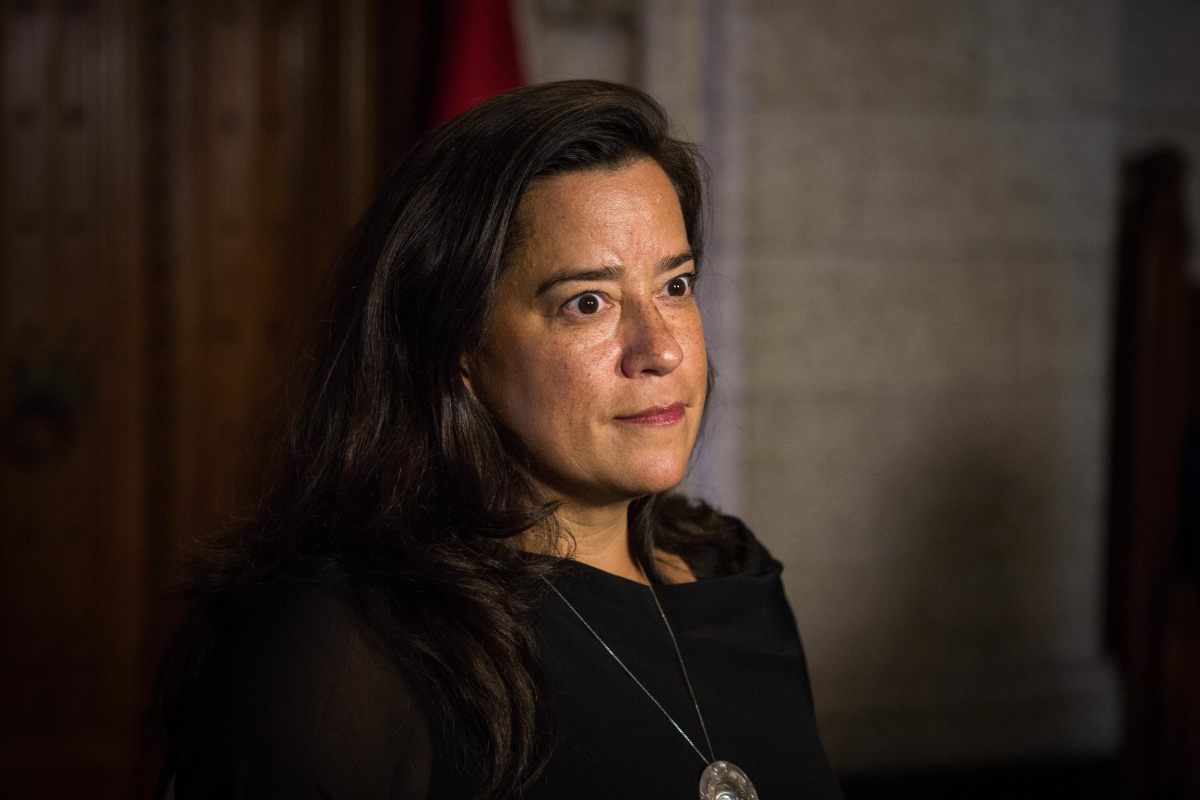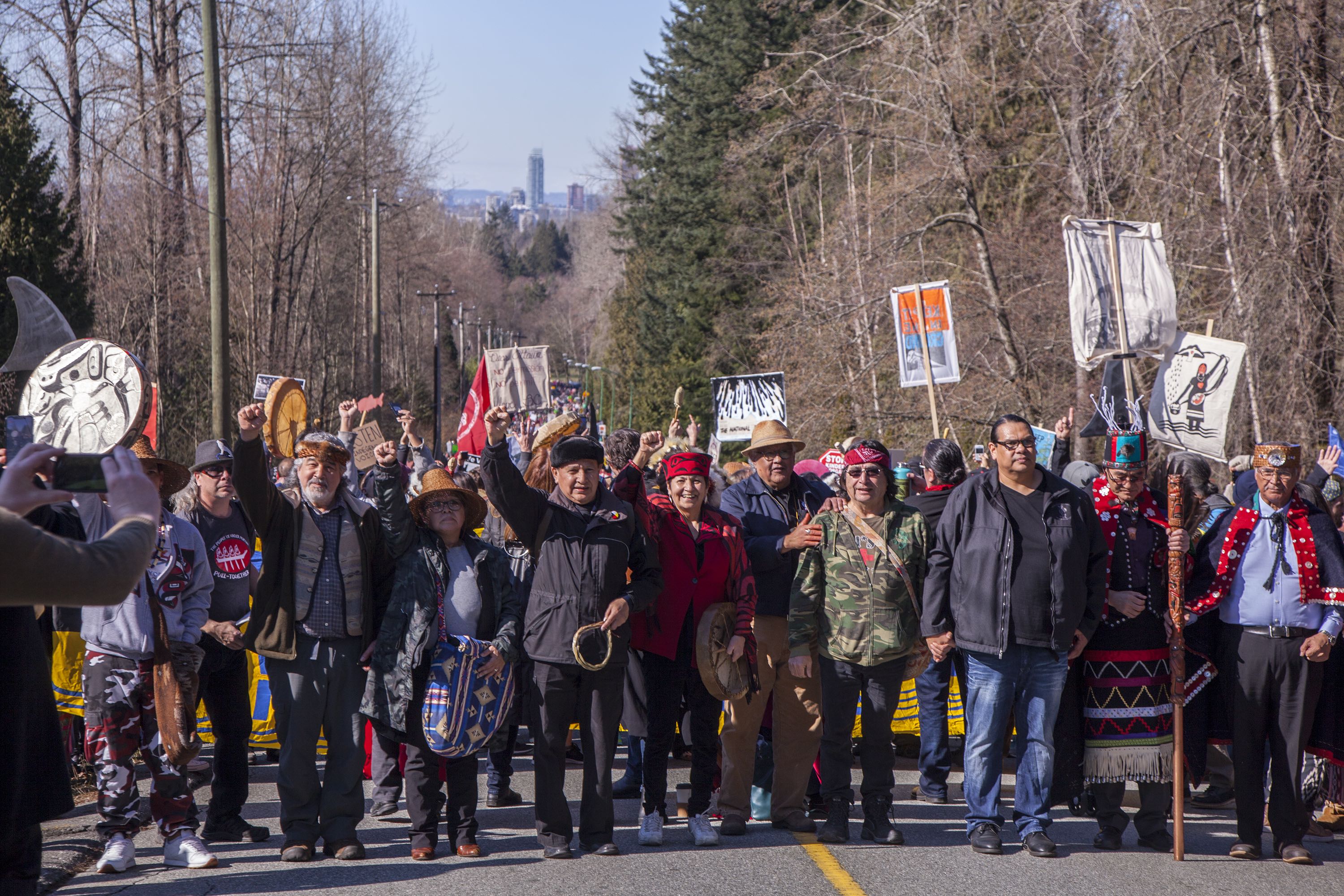Support strong Canadian climate journalism for 2025
Canada and an American energy company want a First Nation in British Columbia to pay for their legal fees following ‘significant’ delay and prejudice to a stalled pipeline expansion project.
A lawyer for Texas-based Kinder Morgan made this request in a newly-released court submission from May 14 that was sent to the Federal Court of Appeal. Counsel for Canada’s Attorney General, Jody Wilson-Raybould, made a similar request in a separate submission on May 11.
The submissions were responding to an extraordinary motion submitted on May 2 by the Tsleil-Waututh Nation, requesting that the court compel the government to release uncensored copies of federal documents cited in a recent investigation by National Observer, including the release of new secret cabinet documents.
The National Observer investigation quoted internal documents and unnamed public servants who said that Prime Minister Justin Trudeau’s decision to approve Kinder Morgan’s Trans Mountain project was rigged. The documents and information released by whistleblowers show how a high-ranking official instructed public servants to find a way to approve the project, even though the government was supposed to be consulting and accommodating First Nations at that time.
Neither the company, nor the government denies that the high-ranking official provided these instructions, but they both claim any such behaviour is “irrelevant” because it doesn’t reflect the “actions” taken by Trudeau’s government in its official meetings with the affected First Nations.
At least four other First Nations disagree and have supported the Tseil-Waututh Nation’s motion in separate court filings.
In each case, these nations — the Coldwater Indian Band, the Stk’emlupsemc te Secwepemc (SSN), the Squamish Nation, and the Upper Nicola Band, say that the documents show that the government believed its approach was “legally sound” before it had even shared a report with the affected First Nations explaining how it planned to accommodate their concerns.
All of these submissions fit into an existing legal challenge to Trudeau’s approval of the Trans Mountain project, which has been mired in delays. Several First Nations have asked the court to overturn the approval because they alleged that the government failed in its legal duty to consult them, as required under Canada’s Constitution.
The case wrapped up its hearings last fall, and a ruling was expected this spring. But the unexpected motion may have delayed the decision, even if the court decides not to accept new evidence. The legal manoeuvres add to other concerns raised by Kinder Morgan, which has warned it may abandon the project if it fails to find ways to mitigate potential losses due to opposition to its plans in British Columbia.
For this reason, Kinder Morgan wants the Tsleil-Waututh to pay for causing delays.
“There are no exceptional circumstances that justify reopening the evidentiary record for the consolidated proceedings,” said a May 14 submission from Maureen Killoran, counsel for Trans Mountain (TM). “On the contrary, the Motion has caused and will cause significant and unwarranted delay and prejudice to TM.”
Executives from the company’s Texas headquarters have said they will walk away if they fail to reach deals with stakeholders prior to May 31, 2018. Officials from the federal and Alberta governments have both said that they are pursuing financial negotiations with the company to save the project.
But Killoran’s submission suggested that the new Tsleil-Waututh motion could cause months of delays.
“If the motion is successful, it may be necessary to file additional affidavit evidence, conduct additional cross-examinations and/or provide submissions on the import of the additional evidence to the issues before the court,” said the Trans Mountain submission to the court. “As such the relief sought by TWN could delay this Court’s decision in the consolidated proceedings by several months.”
Sarah D. Hansen, a lawyer for the Stk’emlupsemc te Secwepemc (SSN), wrote in a submission sent on May 9, 2018 that the records obtained by National Observer through access to information legislation appear to show that the government had made up its mind about approving Trans Mountain by October 2016, even though they had previously made a commitment to the SSN in an Oct. 6, 2016 meeting that they would revise an existing memorandum of understanding (MOU) to improve the consultation process.
“That commitment was not fulfilled,” said Hansen’s submission. “The MOU was never signed by the parties or finalized prior to the (government) decision being made."
Government officials told National Observer that they were instructed by a high-ranking public servant, then-associate deputy minister Erin O’Gorman from the Major Projects Management Office, to find a “legally-sound” way for cabinet to say “yes” to the Trans Mountain project during an Oct. 27, 2016 meeting.
Chief Judy Wilson of the Neskonlith Band of the Secwepemc Nation also recently traveled to a Kinder Morgan shareholders meeting in Houston, and warned investors that First Nations have not all given consent to allow the project to proceed.
“It appears from the new evidence that after October 27, 2016, unbeknownst to SSN, the Crown had no intention of changing its planned consultation process to enter into an MOU as a framework for a new consultation process,” said Hansen's SSN May 9, 2018 submission.
“Further, by October 27, 2016, before it had even received all substantive responses from Indigenous groups on issues and impacts of concern, the Crown had decided not to change its planned consultation process.”
It was only on Nov. 1, 2016 that the SSN received a revised draft of a consultation and accommodation report that said, for the first time, that the government believed that Trans Mountain would cause “negligible-to-minor to minor” impacts on the nation, said Hansen’s submission.
A separate joint submission from F. Matthew Kirchner, a lawyer for the Coldwater Indian Band and the Squamish Nation, said that the two nations also supported the Tsleil-Waututh’s efforts to get access to censored and secret government documents.
“The Documents sought to be admitted provide critical context for the Court in relation to the consultation process from Canada’s perspective, including whether federal officials had a mandate to engage substantively in an interactive consultation process that allowed them the freedom to grapple with the concerns of First Nations as they were raised,” said Kirchner’s submission. “The provision of unredacted copies of these Documents will only further assist the Court in understanding Canada’s approach to consultation.”
The Upper Nicola Band also pointed to meeting notes, released through access to information legislation, that indicated officials at the Oct. 27, 2016 meeting were told they had met a legal standard set under a previous case. That case resulted in the court overturning the former Harper government’s approval of the Enbridge Northern Gateway pipeline in 2016 due to a failure to adequately consult affected First Nations.
But Crystal Reeves, a lawyer for Upper Nicola, wrote in a May 9, 2018 submission that officials didn’t have all of the nation’s views at that time.
“The Documents sought to be admitted confirm the issues that Upper Nicola raised with the Crown and before Panel, that there was insufficient time to meaningfully consult, and that the Crown was not engaged in substantive and good faith consultation with Upper Nicola,” said the submission by Reeves.
“Upper Nicola agrees with TWN (the Tsleil-Waututh Nation) that the interests of justice demand that the evidentiary record be re-opened in this proceeding to admit the Documents.”
In a May 11, 2018 response, Jan Brongers, counsel to Canada’s attorney general, argued that the documents sought were “irrelevant, unnecessary and unlikely to change the result” of the case since they do not make up part of the official record and meeting minutes of consultations with First Nations.
“The assessment of the adequacy of the Crown’s consultation with TWN cannot be done based on the subjective, personal opinions and understandings expressed internally by public servants,” wrote the submission from Brongers. “Instead, the assessment is done on the basis of the evidence of the actual consultation that took place.”
Brongers has also asked the court to ignore any information provided in the recent National Observer articles, due to concerns that they constitute “hearsay” and cannot be tested as evidence.
“These concerns are exacerbated by the fact that the journalist’s sources are alleged anonymous whistleblowers, whose role, involvement, understanding and implication in the matters allegedly spoken to are unknown and cannot be clarified or challenged in the context of this motion,” said the submission from Brongers.
“Accordingly, the National Observer articles and the summary thereof provided by counsel for TWN’s legal assistant in her affidavit should be given no weight in determining this motion.”
Killoran, the lawyer for Trans Mountain, also explicitly suggested that the Tsleil-Waututh Nation should be punished for pursuing the motion to get access to new records, noting that it had failed in a similar motion introduced in June of last year.
“The Court should also consider the three-fold objective of providing compensation, promoting settlement and deterring abusive behaviour,” said Killoran’s submission.
Killoran also noted that the Tsleil-Waututh Nation had neglected to highlight how one of the documents obtained by National Observer from November 3, 2016 – an internal memorandum to the deputy minister – indicated that officials didn’t know whether the federal government had approved the Trans Mountain project.
“The Motion ought never to have been brought; it was entirely duplicative of the June (2017) Motion… and doomed to fail. Further, in bringing the Motion, TWN’s counsel misrepresented the contents of the ATIP documents and omitted key aspects of this Court’s June Motion decision,” Killoran continued in her submission.
“In any event, the records sought (then and now) by TWN are wholly irrelevant and will not influence this Court’s decision as to whether Canada fulfilled its duty to consult TWN. TWN identifies no reasonable basis for the Court to reopen the evidentiary record. It is respectfully submitted that the Motion ought to be dismissed, with costs.”
The Tsleil-Waututh Nation has argued that its existing motion is different due to the new information uncovered by National Observer. It is expected to provide a reply to all of the existing submissions by Thursday.
Deliberations on whether to accept the motion could take weeks.
When asked how its request for the Tsleil-Waututh to pay legal fees is consistent with its efforts to promote reconciliation with Indigenous peoples, the federal Natural Resources Department said in a statement:
“No relationship is more important to our government than the one with Indigenous peoples,” said the department in the statement. “It is standard practice for Government of Canada to request that it be awarded costs in the context of legal proceedings.”






Comments
So now we have our Federal Government applying what is effectively a SLAPP lawsuit against First Nations that they have grossly inadequately consulted. Is this how Trudeau defines reconciliation?
“No relationship is more important to our government than the one with Indigenous peoples,” said the department in the statement.
It is too bad that the government's actions do not match its brave words. What a different country Canada would be if Ottawa actually lived that statement in its relations with indigenous people.
the federal Natural Resources Department said in a statement:“No relationship is more important to our government than the one with Indigenous peoples,” said the department in the statement. “It is standard practice for Government of Canada to request that it be awarded costs in the context of legal proceedings.”
How is it possible for someone to make a statement like this that is so obviously contradictory?? You cannot have good relations with someone you are suing! Back off, Liberals!
Contradictory!! That is essence of most Liberal Parties in our country. The old adage "Liberals talk (campaign) like progressives but govern like conservatives" is very true about these Trudeau Libs.
The First Nations are doing more than defending their territory - they are reminding all of Canada what it means to stand up for Canada.
Ottawa continues to sink to new lows,and becomes entirely loathesome. I wonder if its the drinking water, maybe too much Perrier?
Should it ever happen that charges are levied against this, or any other First Nation engaged in protesting this monstrous anti-environmental pipeline decision, I'll be moving my donations to defend those groups.
Nice damned government we have.